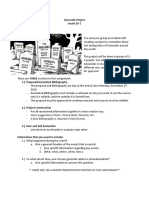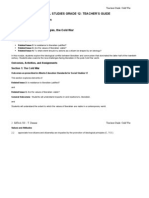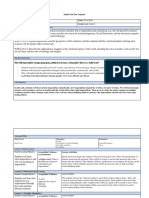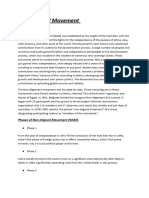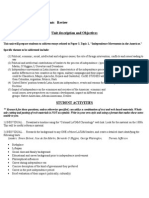Ideologies 30-1 STUDENT GUIDE 2015 EDIT2 PDF
Ideologies 30-1 STUDENT GUIDE 2015 EDIT2 PDF
Uploaded by
asprinkyCopyright:
Available Formats
Ideologies 30-1 STUDENT GUIDE 2015 EDIT2 PDF
Ideologies 30-1 STUDENT GUIDE 2015 EDIT2 PDF
Uploaded by
asprinkyOriginal Title
Copyright
Available Formats
Share this document
Did you find this document useful?
Is this content inappropriate?
Copyright:
Available Formats
Ideologies 30-1 STUDENT GUIDE 2015 EDIT2 PDF
Ideologies 30-1 STUDENT GUIDE 2015 EDIT2 PDF
Uploaded by
asprinkyCopyright:
Available Formats
SOCIAL STUDIES 30-1: IDEOLOGIES
Topic Description:
This guide begins the process of determining your answer to the key issue, “To what extent
should we embrace an ideology?” By examining beliefs and values, and the development of
ideas and models for society that promote self-achievement (individualism), group welfare
(collectivism), or some combination of both, one can begin to see the variety and scope of
ideologies that have been promoted and/or implemented, and begin the process of judging their
merits and limitations. Liberalism will be introduced as an ideology that encouraged both change
and greater recognition of the rights and freedoms of individuals, leading to reform, resistance, or
outright rejection of such principles.
Information
Complete this guide and maintain a set of notes for study and review.
Knowledge and Understanding:
You have probably heard he expression, “the pen is mightier than the sword.” It conveys the
importance and power that ideas can have on individuals and the societies in which we live.
Experience gives rise to values and values influence a range of political behaviors that often lead
to change. Ideologies are deep-rooted beliefs about the nature of man and society. They
determine the experiences of citizens politically, economically, and socially. Ideologies are an
important factor in shaping identity and determining the character of society and its institutions.
▪ General Outcomes:
o Explore the relationship between identity and ideology
o Assess impacts of, and reactions to, principles of liberalism
o Assess the extent to which the principles of liberalism are viable
▪ Content associated with this unit:
issue, perspective, identity, values, citizenship, society, individualism, collectivism, cooperation,
competition, common good, social norms, community, social contract, rule of law,
authoritarianism, rights and freedoms, private property, public property, economic freedom,
economic security, self- interest, entrepreneurship, intellectual property, the welfare state,
progressivism, revolutionary, neo-liberal, neo-conservative, reactionary, radical, moderates,
status quo, tradition, liberalism (classical and modern forms), conservatism, extremism,
anarchism, capitalism, democracy, fascism, socialism, communism, libertarianism, popular
sovereignty, constitutionalism, Six Nations Confederacy, Great Law of Peace
Assessment
Upon completion of this guide you should be prepared to:
1. Answer multiple-choice items on this topic (predominantly source-based)
2. Apply your learning to analyzing and writing about a written or visual source
CCSD – Guided Inquiry Page 1 23/01/2015
3. Complete an assignment to reflect on your preliminary understandings of “Ideology”
BELIEFS, VALUES, AND PERSPECTIVES
o Examine the characteristics of ideology
o Explore the relationship between personal and collective worldviews and ideology
o Explore factors that may influence individual and collective beliefs and values
Activity 1: Beliefs, Values, Self, and Society
Consider the following with reference to pages 4-15, and pages 23-47 in Perspectives on
Ideology:
1. Study the statements about humans and human nature on pages 9-11, and account for the
variety of views presented. Which do you believe to be the most accurate, and why?
a. I believe that the quote from Terry Eagleton is the most accurate about human
nature. This is because it is ideology that causes people to go against each other.
But it is easier to understand why people hurt others for materials for survival. With
this in throught it is hard to see how they may hurt others because of something as
abstract as ideas, yet people live by ideas and may die for them.
2. Outline the fundamental differences, (see page 12), between individualism and collectivism.
How would these mindsets contribute to very different notions, (or worldviews), of what a
society should look like?
a. Individualism is a way of thinking that values the freedom of the individual over the
harmony of the group. Collectivism is a way of thinking that the values and goals of
the group is better than one person's individual goals. These mindsets contribute to
different notions of what society should look like because depending what view they
have, makes them act differently and value different thoughts and actions in society.
3. Consider the Beliefs and Values Inventory on page 30. Based on your responses, would
you classify yourself as more individualist or collectivist?
a. I would classify myself as more collectivist because people rely on each other to
survive. It may be just basic interactions with each other, but we still rely on each
other. If we aren’t prepared to work together as a whole, we shouldn’t expect to be
thriving as an individual.
4. Evaluate this exercise as a means to understanding identity, (individual and collective),
sense of self, the role of citizens in society, and ideology.
a. This exercise is good to understanding someone’s identity because you’re able to
see how they prioritize their values to do with a group and their individual. It also
shows how important they think their role in society is.
5. Consider the list of factors influencing individual and collective beliefs and values. (See
pages 31-47.) Which factors have been the most formative thus far in your own identity
development? The development of Canada?
a. The factors that have been most formative for my own identity development would
be family influence, religious influence, environment, and language. Family influence
is big because for most of my life, I am around family members. They are able to
teach me things to value and what not to. Religion is big because it gives me a basis
on what to believe in for the ‘afterlife’ and how we came to be. Environment and
language go similarly because depending where I was and who I spoke meant
CCSD – Guided Inquiry Page 2 23/01/2015
meeting new people to show their viewpoints on different topics widening my view
on the world.
FOUNDATIONS OF IDEOLOGY AND THE EMERGENCE OF LIBERALISM
o Explore themes of ideologies
o Analyze individualism and collectivism as foundations of ideology
o Examine the relationship between the principles of liberalism and the origins of classical
liberal thought
Activity 2: Themes and Characteristics of Ideologies
Consider the following with reference to pages 16-18, and pages 48-56 in Perspectives on
Ideology:
1. Compare and contrast the views of human nature expressed in the ideas of Hobbes, Locke
and Rousseau.
a. Hobbes
i. English philosopher during the English Civil War.
ii. Believed human nature is characterized by fear, violence, and dangerous self
interest. In other words, extreme individualism. He believed we need more
security than we need freedom.
iii. Conservative.
b. Locke
i. English philosopher unlike Hobbes
ii. Believed people are rational, intelligent, and reasonable. Locke believed the
source of power wasn’t with God, but was people themselves with
revolutionary ideas. Believed the only reason governments exist is to protect
life, liberty, and property.
iii. Liberal.
c. Rousseau
i. Swiss philosopher interested in common good.
ii. Believed that people are inherently good and have been corrupted by
civilization and society. Believed that humans are naturally free and are
equal. Believed that private property and ownership of land had led to
jealousy and corruption. He wants people to go back to the characteristics
that made humans good and equal. he wants people's will to be absolute
authority. He felt citizens themselves should make the laws directly.
iii. Liberal.
2. Why might it be necessary to consider both history and visions of the future when formulating
an ideology?
a. I believe that it is necessary to consider both history and visions of the future when
formulating an ideology because when looking at history, you’re able to see what
ideas worked well and what ideas caused destruction. With this knowledge, we can
speculate what ideologies would be the best for the future.
3. Analyze the ideas of Tommy Douglas, Milton Friedman, or Ovide Mercredi; how does the
speaker you selected make effective use of at least one theme of ideology in their message?
a. Tommy Douglas is a liberal. Talking about how much better change has given us. He
says that we have better roads and health services at lower cost. The issue that he
CCSD – Guided Inquiry Page 3 23/01/2015
brings up is inflation. He says that we have inequitable and unfair distribution of
income. He believes that in order to solve this issue, we should bring in tax reforms.
He says that in doing this, there will be a trickle down affect and lower income tax by
15% while having little effect on the government economy.
4. Comment on your own viewpoint on the issue being raised by the author you have selected;
why would you support or challenge their contentions?
a. I do support this author's viewpoint because I do think that people who are rich have
so much and they don’t do anything with it while less fortunate people are out on the
streets starving. I support the idea that adding tax reforms will have a positive impact
on society and help those who aren’t as fortunate. While it may hurt the people who
have more money, it would help those who don’t a lot more than it hurts the rich.
Activity 3: The Origins and Nature of Collectivism
Consider the following with reference to pages 67-68, pages 80-86, and pages 91-93 in
Perspectives on Ideology:
1. How and why did ancient societies, early Christianity, traditional aboriginal culture, and The
Medieval Period reinforce collectivist thinking and behaviour?
2. Outline the major principles that underlie collectivism.
3. How might the notions of cooperation, economic equality, public property, c ollective interest,
collective responsibility, and adherence to collective norms contribute to human
interdependence and the common good?
4. How do social programs and public services, the Kibbutz, and NGO’s represent
contemporary applications of collectivist thinking?
5. To what extent is child care the responsibility of the government?
Activity 4: The Origins, Philosophy and Nature of Individualism, (Classical Liberalism)
Consider the following with reference to pages 69-79, pages 90-91, pages 96-97, and pages
100-118 in Perspectives on Ideology:
CCSD – Guided Inquiry Page 4 23/01/2015
1. Assess the role of the Renaissance, The Enlightenment, The Protestant Reformation, The
American and French Revolutions, and the Industrial Revolution in stimulating a more
individualistic mindset.
2. Evaluate how the ideas of Hobbes, Locke, Montesquieu, Smith and Mill challenged the status
quo.
3. Explain how the notion of the social contract that is so central to liberalism is reflected in the
ideas of Hobbes, Locke, Montesquieu, Smith and Mill.
4. To what extent is Locke’s belief that “the government should be directly accountable to the
people” realized in Montesquieu’s framework for government?
5. J.S. Mill’s thinking analyzed the dynamic of the individual and his relationship to society.
Explain how this dynamic results in both preservation of, and restriction of, individual liberty.
6. To what extent were Adam Smith’s ideas about economics radical for his time? Influential?
7. Outline the major principles that underlie individualism.
8. How might the notions of rule of law, individual rights and freedoms, private property,
economic freedom, self-interest, and competition contribute to societies focussed on greater
fairness, autonomy, and self-reliance?
9. What does the existence of a strong entrepreneurial spirit in North America suggest about
contemporary views towards individualism?
10. Study the investigation on pages 76-77. Should consumers be allowed to freely download
intellectual property?
Activity 5: Identifying, Characterizing, and Organizing Ideologies
Consider the following with reference to page 51, and page 274 in Perspectives on Ideology, The
Political Spectrum (Notes on D2L) a nd the Political and Economic Spectrum interactive graphics:
1. Briefly identify the characteristics and beliefs of radicals, liberals, moderates, conservatives,
and reactionaries in the 20th century.
CCSD – Guided Inquiry Page 5 23/01/2015
1. Outline the mindset of a radical, liberal, m oderate, conservative, and reactionary in relation to
their tolerance for change.
2. Compare and contrast the position of classical liberalism with modern liberalism in regards to
the role of government.
3. How did the movement toward progressivism c ontribute to more modern interpretations of
liberalism?
4. Account for the rise of libertarianism in response to increased government oversight.
5. On the issue of promoting change in social conditions, briefly describe the position of
anarchists, communists, s ocialists, liberals, c onservatives, and fascists.
6. On the issue of government intervention in the economy, briefly describe the position of
anarchists, communists, socialists, liberals, conservatives, and fascists.
CCSD – Guided Inquiry Page 6 23/01/2015
7. Explain why the radical theory of communism and the reactionary ideology of fascism,
although polar opposites, can also be justifiably placed at the same point on a spectrum
depicting the power of government in society.
8. Evaluate the limitations and merits of depicting ideologies as spectrums or quadrants.
CONSERVATISM
o Analyze ideologies that developed in response to classical liberalism
Activity 6: Classical Conservatism
Consider the following with reference to pages 140-141 of Perspectives on Ideology:
1. Evaluate the validity of Burke’s ideas as a response to the extremes and excesses of radical
change in the 18th Century.
CCSD – Guided Inquiry Page 7 23/01/2015
2. Why are tradition, authority, elitism, privilege, and the maintenance of the status quo central
to conservative thought?
ABORIGINAL INFLUENCES
o Explore Aboriginal contributions to the development of liberalism
“We are a Métis civilization.
What we are today has been inspired as much by four centuries of life with indigenous
civilizations as by four centuries of immigration. Perhaps more. Today we are the outcome of that
experience. As have Métis people, Canadians in general have been heavily influenced and
shaped by the First Nations. We still are. We increasingly are. This influencing, this shaping is
deep within us.
When I dig around in the roots of how we imagine ourselves, how we govern, how we live
together in communities-how we treat one another when we are not being stupid- what I find is
deeply Aboriginal. Whatever our family tree may look like, our intuitions and common sense as a
civilization are more Aboriginal than European or African or Asian, even though we have created
elaborate theatrical screens of language, reference and mythology to misrepresent ourselves to
ourselves.
Our leaders endlessly mull over our institutional and cultural inheritance from British
parliamentary democracy, British and French justice, the Enlightenment, British liberalism,
Western individualism with its important variations, U.S. populism, Judeo-Christian moral
questioning, Athenian principles of citizenship and democracy, Western European philosophy,
Western social democracy, Western capitalism, in particular its U.S. form. Frankly, once you get
below the surface, I see very little in the way we use all of these that would ring familiar bells in
Britain, France or elsewhere in Europe or in the United States.
Then as if to offset all of these efforts made to conform intellectually, emotionally and structurally
to the Western canon of ideas and actions, we set aside time to praise ourselves for the great mix
of cultures with which we so comfortably live. We point out that our friends and allies around the
world are having trouble with similar situations. This talent, we seem to be saying, for living
comfortably with diversity, is our particular contribution to Western Civilization. Yet we never
seriously asked ourselves how that came to be. After all, if our civilization has been built out of
the western inheritance, how is it that the rest of the West is struggling precisely where we find
challenges quite easy?
Stranger still, in this process of examining our Western inheritance, and vaunting it, there is
scarcely a nod, let alone a meaningful nod, in the direction of the First Nations, the Métis, the
Inuit. There is no intellectual, ethical or emotional engagement with what their place might be at
the core of our civilization. On the single issue of immigration and citizenship diversity, we seem
unable to notice the obvious- that it is a non-racial idea of civilization, and non-linear, even
non-rational. It is based on the idea of an inclusive circle that expands gradually and adapts as
new people join us. This is not a Western or European concept. It comes straight from aboriginal
culture. But then, why bother to invoke the First Nations idea of the circle as a concept of
inclusivity when you can fall back on Kant or John Stuart Mill? At best we manage a pro forma
phrase about Aboriginals as one of our founding peoples.”
The passage above from John Ralston Saul’s book A Fair Country: Telling Truths About Canada
raises a very important set of questions for us to consider in the study of ideologies and liberalism
in particular: “To what extent have aboriginal ideas influenced the development of liberal
societies like Canada, and liberalism itself?”
A common starting point in the exploration of these questions is to examine North American
society, its policies and institutions for Aboriginal influences. Perhaps the most concrete example
of these influences is found in the legacy of the Haudenosaunee (The Iroquois & Six Nations
CCSD – Guided Inquiry Page 8 23/01/2015
Confederacy) and its constitution the Gawyehnehshegowa (the Great Law of Peace).
Archaeologists and anthropologists now estimate that this agreement was reached as early as
the 12th century making it the oldest and longest lasting participatory democracy on earth.
Activity 6: Aboriginal Contributions to Liberal Thought and Practice
Consider the following with reference to the information provided above, The Haudenosaunee
Confederacy, and page 116 of Perspectives on Ideology:
1. To what extent are liberal ideas (freedom of speech, individual rights, limited government,
religious toleration, equality, etc.) embedded in the Gawyehnehshegowa?
2. Given the history of contact with the members of the Haudenosaunee is it likely that the
institutions of modern Western societies, especially in North America, are purely inherited
from European liberalism?
Activity 7: Canadian Legacies
Consider the following with rreference to the information provided and pages 66-67 of
Perspectives on Ideology:
The following passage is an excerpt from discussion of First Nations Treaty negotiations during
the reign of Queen Victoria in the UK (and much of what is now Canada):
“The First Nations had protocols they had to follow in order for agreements with others to take
proper shape and so become real...They wanted balanced arrangements that could work for a
long time, providing both parties were prepared to keep on discussing and adjusting on a regular
basis...It sounds just like Canadian Federalism...In Cree alone, you find a vast array of concepts
central to these protocols-concepts that describe how people can live together. These are not in
the first instance about ownership or control. They are about sustainable human relationships.
More important still, they are about harmony in a world in which humans are only one element
among a vast panoply of dynamic forces...the Cree were negotiating on the basis of Witaskewin-
how people, not necessarily coming out of the same nation, can live together. It is an idea of
carefully negotiated and continually renegotiated peaceful co-existence.”
- A Fair Country pp.50-51.
1. Based upon your own knowledge and experience can you identify elements of modern
Canada that reflect Aboriginal protocols like Witaskewin?
2. To what extent is Canada a hybrid of European and Aboriginal practice?
CCSD – Guided Inquiry Page 9 23/01/2015
You might also like
- Compare and Contrast of Durkheim and MarxDocument14 pagesCompare and Contrast of Durkheim and MarxPriyha Sissy100% (1)
- Containment Structured Academic Controversy-YesDocument6 pagesContainment Structured Academic Controversy-Yesapi-526098972No ratings yet
- Wwi Gallery Walk Lesson PlanDocument4 pagesWwi Gallery Walk Lesson Planapi-323269525No ratings yet
- Free Speech - Literature Review 2Document9 pagesFree Speech - Literature Review 2api-461515479No ratings yet
- Mccarthyism DBQDocument7 pagesMccarthyism DBQapi-281321560100% (1)
- Michael Sandel, Public PhilosophyDocument35 pagesMichael Sandel, Public PhilosophyGeorgia WarnkeNo ratings yet
- Comparing Imperialism in AfricaDocument1 pageComparing Imperialism in Africaapi-276669719100% (1)
- OPVL Minnesota HumanitiesDocument5 pagesOPVL Minnesota Humanitiescmurray1283325No ratings yet
- Ws Promoting NationalismDocument4 pagesWs Promoting Nationalismapi-293989887No ratings yet
- Welfare Discipline: Discourse, Governance and GlobalizationFrom EverandWelfare Discipline: Discourse, Governance and GlobalizationNo ratings yet
- Review-Social 30-1 Test Taking StrategiesDocument15 pagesReview-Social 30-1 Test Taking StrategiessilverstormeclipseNo ratings yet
- Questions On The Interwar PeriodDocument4 pagesQuestions On The Interwar PeriodxaajibanaadirbanaadiriNo ratings yet
- Interwar Years Hope or DespairDocument3 pagesInterwar Years Hope or Despairapi-302040090100% (1)
- Genocide Project 20-1Document2 pagesGenocide Project 20-1api-300964436No ratings yet
- Various Source AnalysisDocument2 pagesVarious Source AnalysisElyse RowleyNo ratings yet
- Social Studies 30-1 To What Extent Should We Embrace An Ideology?Document63 pagesSocial Studies 30-1 To What Extent Should We Embrace An Ideology?starwarsnerdNo ratings yet
- ww2 LessonDocument4 pagesww2 Lessonapi-365479423No ratings yet
- Teachers Guide Lesson Plan Cold WarDocument18 pagesTeachers Guide Lesson Plan Cold Warapi-235491175100% (1)
- 30-1 IntroDocument16 pages30-1 IntrowefrghnjNo ratings yet
- Social 30 Cold War AssignmentDocument3 pagesSocial 30 Cold War Assignmentapi-235491175No ratings yet
- Social Studies 30-1Document2 pagesSocial Studies 30-1Kyle WongNo ratings yet
- The Sociological Perspective: "Seeing The General in The Particular"Document34 pagesThe Sociological Perspective: "Seeing The General in The Particular"Cassandra OlivaresNo ratings yet
- DBQ - Living Under TotalitarianismDocument11 pagesDBQ - Living Under Totalitarianismapi-280706116No ratings yet
- Containment Structured Academic Controversy-NoDocument6 pagesContainment Structured Academic Controversy-Noapi-526098972No ratings yet
- Liberalism - Basics, Origins & Roots.Document7 pagesLiberalism - Basics, Origins & Roots.Pranjal SharmaNo ratings yet
- Hitlers GambleDocument6 pagesHitlers GambleDanielle Worley TarverNo ratings yet
- Decision-Making in Times of Injustice Lesson 16Document18 pagesDecision-Making in Times of Injustice Lesson 16Facing History and Ourselves100% (2)
- Comparing Progressive PresidentsDocument2 pagesComparing Progressive PresidentsRichard Cormier100% (1)
- Social 30-1 Year PlanDocument1 pageSocial 30-1 Year Planapi-336268254No ratings yet
- Presentation - John Stuart MillDocument21 pagesPresentation - John Stuart Millmaam5a_93No ratings yet
- Industrial Revolution Summative Newsletter RubricDocument2 pagesIndustrial Revolution Summative Newsletter Rubricapi-251167841No ratings yet
- Importance of ImperialismDocument3 pagesImportance of Imperialismapi-376757757No ratings yet
- LIBERATION MOVEMENT Social WorkDocument24 pagesLIBERATION MOVEMENT Social WorkjogiedejesusNo ratings yet
- DHS H2 Hist P1Document5 pagesDHS H2 Hist P1How wunNo ratings yet
- Friedrich_Political Thought of Neo-Liberalism_1955Document18 pagesFriedrich_Political Thought of Neo-Liberalism_1955kylie.gilchristNo ratings yet
- Recent Italian Historiography On Italian Fascism: Danilo BreschiDocument30 pagesRecent Italian Historiography On Italian Fascism: Danilo BreschiTiago GomesNo ratings yet
- JFK's Inaugural Address (1961)Document4 pagesJFK's Inaugural Address (1961)Jim9870100% (1)
- DMS Lecture 3Document27 pagesDMS Lecture 3_Q__4413100% (1)
- "Where There Is No Law, There Is No Freedom." John Locke 1632-1704Document16 pages"Where There Is No Law, There Is No Freedom." John Locke 1632-1704Anonymous 13ulUnpZ100% (1)
- Domain B - Artifact 1 AssessmentsDocument5 pagesDomain B - Artifact 1 Assessmentsapi-283432490No ratings yet
- Org Culture ClimateDocument39 pagesOrg Culture ClimategvspavanNo ratings yet
- PJC H2 Hist P1Document6 pagesPJC H2 Hist P1MaverickNo ratings yet
- Alternatives To Power PoliticsDocument27 pagesAlternatives To Power PoliticsUsman Tariq100% (1)
- Social 30-1 Midterm Exam ReviewDocument7 pagesSocial 30-1 Midterm Exam ReviewNida HonorioNo ratings yet
- OPVL Source Evaluation GuidelinesDocument3 pagesOPVL Source Evaluation GuidelinesSmita ChandraNo ratings yet
- Dunne4e ch01Document12 pagesDunne4e ch01guessoumiNo ratings yet
- Politics Political Theory ConservatismDocument23 pagesPolitics Political Theory ConservatismJohn McTaggartNo ratings yet
- History Paper 2 TipsDocument6 pagesHistory Paper 2 TipspancakeeatsNo ratings yet
- Non Alignent MovementDocument14 pagesNon Alignent Movementsureshkumarkrishna21No ratings yet
- Collective Behavior, Social Movements, and Social ChangeDocument19 pagesCollective Behavior, Social Movements, and Social ChangeLexuz GatonNo ratings yet
- The Second New DealDocument6 pagesThe Second New DealsuperghnaboyNo ratings yet
- The Counterculture of The 1960sDocument3 pagesThe Counterculture of The 1960sChetanya Mundachali100% (1)
- DBQ Women's Suffrage and Civil RightsDocument11 pagesDBQ Women's Suffrage and Civil RightsSheryl SinclairNo ratings yet
- Reformation WebquestDocument2 pagesReformation Webquestapi-209245233No ratings yet
- Apush FinalDocument12 pagesApush Finalapi-287571897No ratings yet
- Final Latin American ReviewDocument3 pagesFinal Latin American ReviewMalcolm Duncan0% (1)
- Paris Peace Treaties PDFDocument14 pagesParis Peace Treaties PDFINDRANI GOSWAMINo ratings yet
- WWII PPT - RevisedDocument23 pagesWWII PPT - Revisedjosberg1No ratings yet
- History of The United Nations Charter: 12 June 1941Document2 pagesHistory of The United Nations Charter: 12 June 1941Georgiana AriesNo ratings yet
- Mussolini - Consolidation of PowerDocument2 pagesMussolini - Consolidation of PowerAlicjaNo ratings yet
- The Welfare State in Canada: A Selected Bibliography, 1840 to 1978From EverandThe Welfare State in Canada: A Selected Bibliography, 1840 to 1978No ratings yet
- Socialization and Civil SocietyDocument34 pagesSocialization and Civil SocietyagapizzzzNo ratings yet
- Self-Realization Is in Every MomentDocument4 pagesSelf-Realization Is in Every MomentBIKRAM KESHARI BHARATI100% (1)
- Kant On Sex: Sexual Abuse in Marriage, Nonmarital Sex, and HomosexualityDocument16 pagesKant On Sex: Sexual Abuse in Marriage, Nonmarital Sex, and HomosexualityNusheena ParviziNo ratings yet
- The Roots and Method of Phenomenological RealismDocument133 pagesThe Roots and Method of Phenomenological RealismYuri OberlaenderNo ratings yet
- Dialectics at A StandstillDocument12 pagesDialectics at A StandstillkikobenitezNo ratings yet
- 2019-Individualism Vs Collectivism InDifferent Cultures A Cross-CulturalstudyDocument11 pages2019-Individualism Vs Collectivism InDifferent Cultures A Cross-CulturalstudyAlbertus PantraNo ratings yet
- Plato and JusticeDocument6 pagesPlato and JusticeKoshika ChawlaNo ratings yet
- UtilitarianDocument11 pagesUtilitarianVarun GogiaNo ratings yet
- Might Is Right Ragnar RedbeardDocument102 pagesMight Is Right Ragnar RedbeardVictor Del RioNo ratings yet
- Contemporary Materialism: Its Ontology and Epistemology: Gustavo E. Romero Javier Pérez-Jara Lino Camprubí EditorsDocument390 pagesContemporary Materialism: Its Ontology and Epistemology: Gustavo E. Romero Javier Pérez-Jara Lino Camprubí EditorsGustavo Martínez100% (1)
- Confucian EthicsDocument6 pagesConfucian EthicsKatrina MariscalNo ratings yet
- Piaget's Stages of Cognitive Development: 3. Concrete Operations StageDocument2 pagesPiaget's Stages of Cognitive Development: 3. Concrete Operations StageMARIE ROSE L. FUNTANARNo ratings yet
- Philosophy Course OutlineDocument3 pagesPhilosophy Course OutlineJhon Mark AlarconNo ratings yet
- Bourdieu Public Opinion Does Not Exist PDFDocument4 pagesBourdieu Public Opinion Does Not Exist PDFditaritoNo ratings yet
- Allen Buchanan - The Egalitarianism of Human RightsDocument33 pagesAllen Buchanan - The Egalitarianism of Human RightscinfangerNo ratings yet
- PLP4001 Basic Principles I Pack 1: Provides The - Roots For The ScienceDocument8 pagesPLP4001 Basic Principles I Pack 1: Provides The - Roots For The SciencetoombombNo ratings yet
- Indian Philosophy in Modern TimesDocument5 pagesIndian Philosophy in Modern TimesVeeramani ManiNo ratings yet
- Aysa y Usay Arili: Introduction To The Philosophy of The Human Person Second Quarterly Assessment ScoreDocument3 pagesAysa y Usay Arili: Introduction To The Philosophy of The Human Person Second Quarterly Assessment ScoreAr Nhel DGNo ratings yet
- Students in Ethics: The New El Salvador Colleges, IncDocument1 pageStudents in Ethics: The New El Salvador Colleges, IncMaybs Tapay CagatinNo ratings yet
- Everyone Is A Ventriloquist Interview Wi PDFDocument5 pagesEveryone Is A Ventriloquist Interview Wi PDFMarusia Pola MayorgaNo ratings yet
- Introduction To ProlegomenaDocument5 pagesIntroduction To ProlegomenaAndreas SetiawanNo ratings yet
- Maslow's Hierarchy of NeedsDocument7 pagesMaslow's Hierarchy of NeedsMaan MaanNo ratings yet
- (Elements in Religion and Monotheism) Deborah Casewell - Monotheism and Existentialism-Cambridge University Press (2022)Document76 pages(Elements in Religion and Monotheism) Deborah Casewell - Monotheism and Existentialism-Cambridge University Press (2022)Jaka ŠtokaNo ratings yet
- Chapter 9 BookDocument20 pagesChapter 9 BookDevansh GoelNo ratings yet
- Professional Ethics and Human Values - GE1301Document1 pageProfessional Ethics and Human Values - GE1301s.meinathanNo ratings yet
- (Cambridge Language Teaching Library) David Nunan-Designing Tasks For The Communicative Classroom-Cambridge University Press (1989)Document51 pages(Cambridge Language Teaching Library) David Nunan-Designing Tasks For The Communicative Classroom-Cambridge University Press (1989)0787095494No ratings yet
- Pol3 - Ethics and World PoliticsDocument58 pagesPol3 - Ethics and World Politicsrabarber19000% (1)
- 1Document17 pages1Rajat Kumar100% (5)
- Chapter 1 PHILOSOPHICAL PERSPECTIVES OF THE SELFDocument17 pagesChapter 1 PHILOSOPHICAL PERSPECTIVES OF THE SELFJayjo Segundo100% (1)













